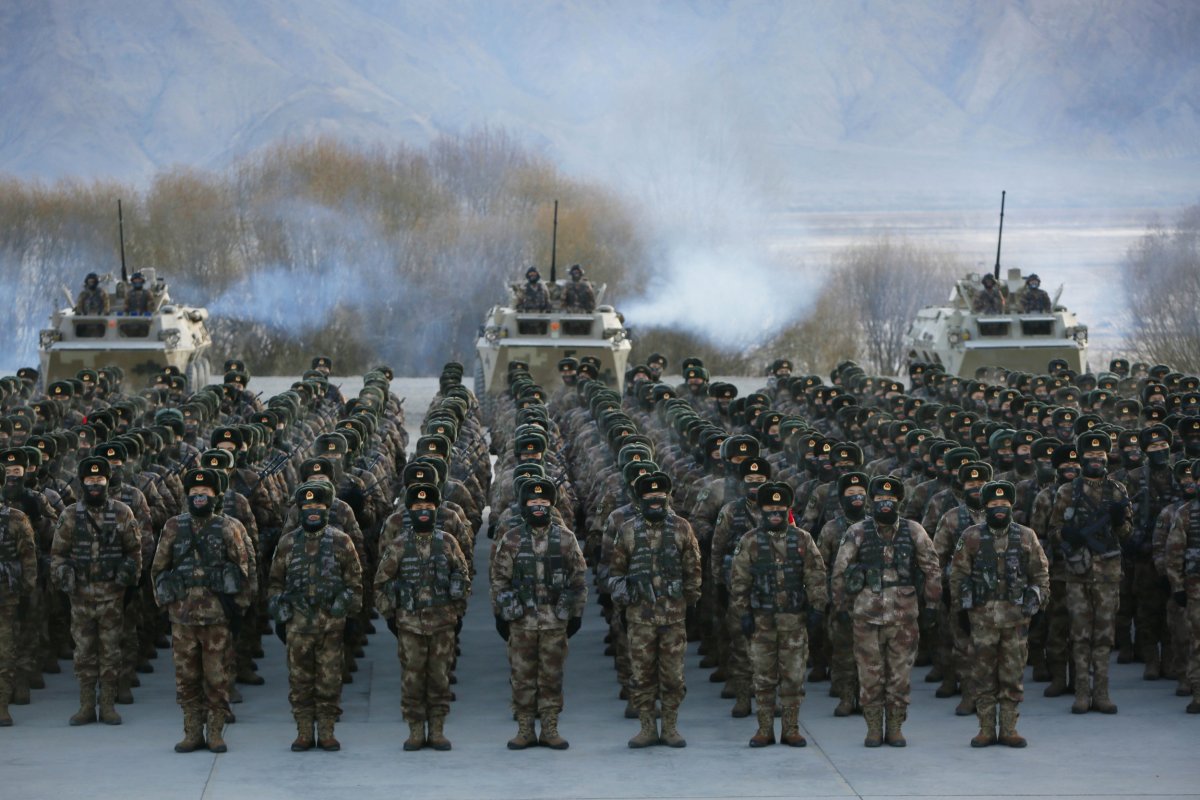A Chinese official downplayed more nationalistic war talk from the country's military on Wednesday after a viral video—seen to be directed at Taiwan—told "enemy" forces to put down their weapons and surrender to Beijing.
Propaganda footage shared by the People's Liberation Army (PLA) 81st Group Army, based in north China, featured a large-scale training exercise dated January 4. A female narrator promised preferential treatment to any prisoners of war.
"Surrender now! Hand in your weapons and you won't be killed. We treat prisoners well!" the commentary said. "Your defenses have collapsed; resistance is futile."
The viral video—carried by local media including China's official press agency Xinhua on January 5—was recorded in Mandarin Chinese, but the phrases were also repeated in Hakka and Minnan, two Chinese dialects spoken by a combined 15 million people—or some 65 percent—of Taiwan's population.
Pointed Message to Taiwan
Social media users on Weibo, China's main social media service, viewed the inclusion of the popular dialects as a pointed message to the island, a self-governing democracy that Beijing has claimed for more than seven decades, and which it has vowed to take by force if necessary. In Taiwan, news outlets interpreted the video as the Chinese military seeing Taiwanese people as the enemy.
At a twice-a-month press conference in Beijing, China's Taiwan Affairs Office (TAO) sought to tone down the bellicose rhetoric behind the video. Its spokesperson, Zhu Fenglian, described the PLA as "a guardian of the Chinese nation's interests" across the Taiwan Strait.
"PLA training exercises target an extremely small minority of Taiwan independence separatists, their separatist activities and interference by foreign forces," said Zhu. "They are absolutely not aimed at the vast majority of compatriots in Taiwan."
"We would never treat compatriots in Taiwan as the 'enemy,'" she said.
Regular public surveys in Taiwan have found little interest in being ruled from Beijing under its proposed "one country, two systems" model—the same currently used to govern Hong Kong. Chinese officials in general and those at the TAO in particular have dismissed the Taiwanese public's preference as a view held only by a select few in the government, despite its election on a popular mandate.
Chinese leader Xi Jinping's insistence that Taiwan will be "unified" with the mainland, and that it is also the desire of the general public on the island, has led to the emergence of extreme domestic nationalism among certain sectors in China, resulting in loud calls—especially online—for a military solution in the near future.
Beijing has more than once had to dispel rumors that the country is on the brink of war with Taiwan, while the PLA has not shied away from the topic either. Taiwan, for its part, is modernizing its own forces to deter the next cross-strait crisis, and the public is displaying an increasing will to fight to avoid living under Chinese Communist Party rule.
Grassroots Nationalism
The topic of ultranationalism in China was one referenced by Chinese professor Yan Xuetong during a political science seminar on January 8. Yan, 69, is dean of the Institute of International Relations at Tsinghua University in Beijing.
Discussing political attitudes to international relations among Chinese students born after 2000, Yan said they display "a strong sense of superiority and self-confidence" while holding "condescending" views of other countries. His younger students believe China can easily achieve its foreign policy goals, a phenomenon he described as "wishful thinking."
They tend to divide the world into two groups—China and everyone else. Universal values such as peace, morality, fairness and justice, he said, are seen as uniquely Chinese. China is righteous and innocent; all others, particularly the West, are "evil" and have a natural hatred of China.
Yan found China's youths to be "deeply influenced by concepts online," treating popular ideas such as economic determinism, conspiracy theories and the weaponization of debt as common knowledge. Among his suggestions for teaching international relations to younger students was the introduction of more current events to help them "understand current objective truths and avoid blind self-confidence."
His comments—viewed by some online as controversial and possibly an affront to Xi's foreign policy approach—were reported by public WeChat social media account New Youth in International Relations on Wednesday

Uncommon Knowledge
Newsweek is committed to challenging conventional wisdom and finding connections in the search for common ground.
Newsweek is committed to challenging conventional wisdom and finding connections in the search for common ground.
About the writer
John Feng is Newsweek's contributing editor for Asia based in Taichung, Taiwan. His focus is on East Asian politics. He ... Read more
To read how Newsweek uses AI as a newsroom tool, Click here.








